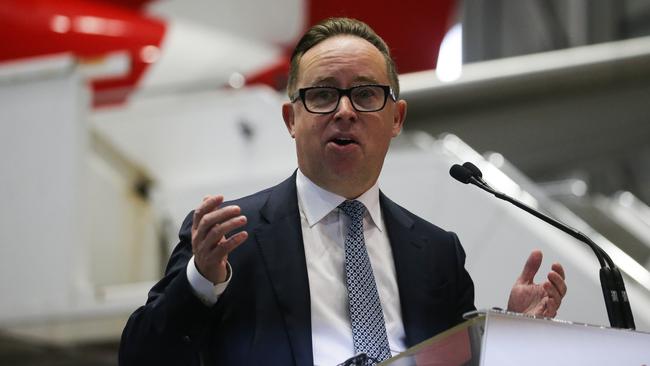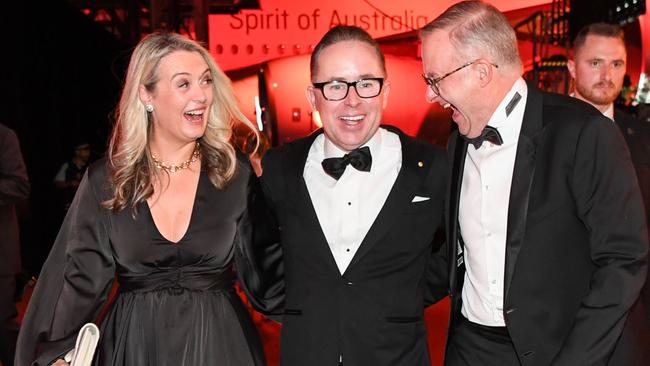
The too-tight relationship between Qantas and Canberra was scorched into the public’s memory last year when – amid record high airfares and a lack of flights to Europe – the government rejected an application by Qatar to increase flights.
The mid-2023 decision, which Qatar Airways found out about through the press, came with a garbled list of reasons. The ruling clashed with recommendations from key stakeholders who had been calling for greater competition, and was seen as a major win for staunch rival Qantas, which was just about to post a record $2.46bn profit.
The Prime Minister met with Mr Joyce in November 2022, in one of four official meetings held over a year or so.
Neither of the two have disclosed what was discussed but the Mr Albanese last year denied he had been lobbied by Mr Joyce to protect Qantas from its higher-end rival Qatar Airways.
On Thursday, amid new publicity about those meetings, his office restated that position.

“As the Prime Minister told the House on 5 September: ‘I once again confirm I did not speak to the former Qantas CEO before a decision was made’,” said a government spokeswoman.
The opposition has relished the chance to stick the boot into the PM, with transport spokeswoman Bridget McKenzie pointing out that it would have been strange for Mr Joyce not to have been looking after the interests of Qantas in any such meeting.
Mind you, industrial relations reform was a more likely hot topic.
And the truth is that Mr Joyce didn’t need to be doing that kind of person-to-person lobbying. Plausible deniability comes from having others delivering messages and Qantas has first class lobbyists.
The airline’s messaging would have been delivered softly: the importance of a national carrier, gentle reminders of the incident in Qatar when several Australian women were forcibly removed from a flight and stripsearched, bribery scandals involving Qatar winning the FIFA World Cup, the unfair advantage of an oil-rich country funding an airline.
Qantas used to make some of the same arguments against Emirates Airways before the two enemies became friends, tied up in a profit-sharing alliance on flights between Australia and Europe via Dubai.
The fact that Qantas would have pushed hard to stop Qatar increasing its flights – although probably not at the meetings in question – is a statement of the obvious.
Qatar has arguably the best product on the market, and any high-spending passengers who get a taste for its Qsuite business class product would certainly notice a step down flying Qantas.
It will be particularly important for Qantas to retain its business class flyers when it launches its Project Sunrise direct flights from Sydney to London and New York next year, as the economics of these services will rely on its aircraft being full up the front.
The big question is not what Qantas did, but how the government responded.
Following the furore over its blocking of Qatar, the government has now come full circle and recently forged a deal with Turkey which will allow Turkish Airlines to fly 21 flights a week from early this year, rising to 35 flights a week next year. Meantime, Qatar is likely to resubmit its request to increase services.
It certainly appears that Mr Albanese has received the message that protecting Qantas – the nation’s most complained-about company – fails the pub test.
Mind you, as the Liberal, Nationals and Green politicians throw stones at the tight relationship between Qantas and the Labor Party, many may want to examine why they still all chose the Flying Kangaroo.
Data compiled last year showed only 10 per cent of parliamentarians and their staff fly Virgin domestically. That means about 80 per cent of them are flying Qantas, even though the airline is usually about 20 per cent more expensive than the nation’s second-biggest carrier.
Parliamentarians fly Qantas because of its powerful frequent flyer business, with its perceived lure of international flights, Platinum and Chairman’s Lounge upgrades and special services.
So for all the talk that the relationship between Qantas and Canberra being too tight, booking habits would suggest that tight won’t change anytime soon.




The question of how much sway former Qantas chief executive Alan Joyce had over Anthony Albanese has reared its head again following political speculation about what the two men discussed in a meeting that coincided with lobbying against Qatar.